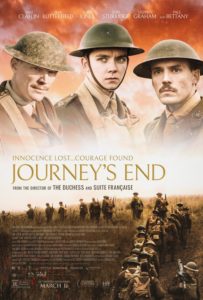 War is hell. Especially in this World War One drama, where almost the entire film is set in the trenches just yards away from the enemy Germans. It takes place over just four days and is adapted from a well-known play by WWI veteran R.C. Sherriff. What is different in this war movie though is that it isn’t about the derring-do, but is a portrayal of the time between the battles — the anticipation, the camaraderie and the boredom. Only a few of the officers know from very early in the story that they are vastly outnumbered and that there will be no reinforcements. They’re to be sacrificed to slow down the Germans. But stiff upper lip and all that rot, so they soldier on for the cause. And for their leader Captain Stanhope (Sam Claflin, Hunger Games), it’s tearing him apart.
War is hell. Especially in this World War One drama, where almost the entire film is set in the trenches just yards away from the enemy Germans. It takes place over just four days and is adapted from a well-known play by WWI veteran R.C. Sherriff. What is different in this war movie though is that it isn’t about the derring-do, but is a portrayal of the time between the battles — the anticipation, the camaraderie and the boredom. Only a few of the officers know from very early in the story that they are vastly outnumbered and that there will be no reinforcements. They’re to be sacrificed to slow down the Germans. But stiff upper lip and all that rot, so they soldier on for the cause. And for their leader Captain Stanhope (Sam Claflin, Hunger Games), it’s tearing him apart.
The film opens with fresh-faced young officer Raleigh (Asa Butterfield, Hugo) requesting to be assigned to Stanhope’s unit. They’ve know one another for years and Raleigh has great admiration for him. But when he arrives, he sees that Stanhope is not the man he knew, but a hard-drinking tyrant of a commander. My initial impression was,”What an asshole!” But as the story progresses and you get to know him, you see how the war has destroyed him. And that is the strength of this film. The characters are layered and whole and totally believable. Stanhope is tempered by Lt. Osborne (Paul Bettany), a school teacher with a calming influence. And there are a handful of others who move in and out of Stanhope’s orbit, earning his wrath and but also his empathy.
What the whole movie is moving towards is the all out battle with the Germans. But leading up to the big fight is a mission. The powers that be decide that a ten-man team is going to go on a daylight raid to bring back a German so they can get information from him. It’s a suicide mission and the men going into it know it. But Stanhope has to follow his superior’s orders, and while the mission is a success, he loses more than half the men. And they are his men. He may not show them warmth, but he feels every death.
Journey’s End isn’t a happy film, but it’s the most honest war movie I’ve seen in a while. It doesn’t depend on special effects like Dunkirk or big heroics like Saving Private Ryan. It’s anchored in relationships and characters and a smart script. And it is extremely affecting. The film is tense and heartbreaking and tender. And I recommend it to wide audiences who like sturdy small dramas with great characters.
[Mainstream Chick’s take: I was ambivalent about this film during the first half-hour or so since I’m not a big fan of war movies and this one was about as claustrophobic, dark (literally) and battle-weary as they come. Plus, it’s hard to relate to the events of WWI, which took place well before our time. Ultimately, however, Journey’s End is not so much about that particular war as it is a powerful study in what any war does to the men in the trenches, on the front line. Warfare changed dramatically after WWI which is why Journey’s End is able to focus so much on the intensity, apprehension and quiet as opposed to firepower, air support and technology. Paul Bettany (Vision in the Avengers movie, and the voice of Jarvis in Iron Man) is quietly compelling as the unit’s solid, steady second-in-command; Sam Claflin (Me Before You) is surprisingly layered and affecting as the jaded alcoholic Captain Stanope; and Asa Butterfield can almost be forgiven for The Space Between Us. His transition from a wide-eyed and eager newly-minted officer to shell-shocked, disillusioned soldier is tough to watch, mostly because you know his journey can’t end well. The film grew on me. But you have to be in the right mindset to tackle this one. It’s got some great performances. But it’s a downer. -hb]
